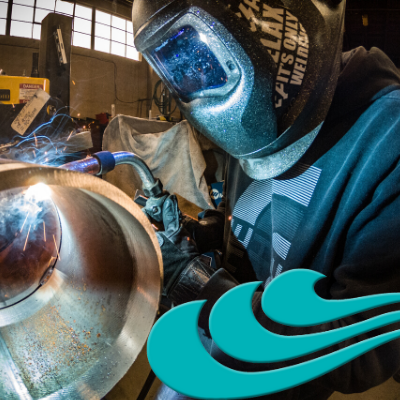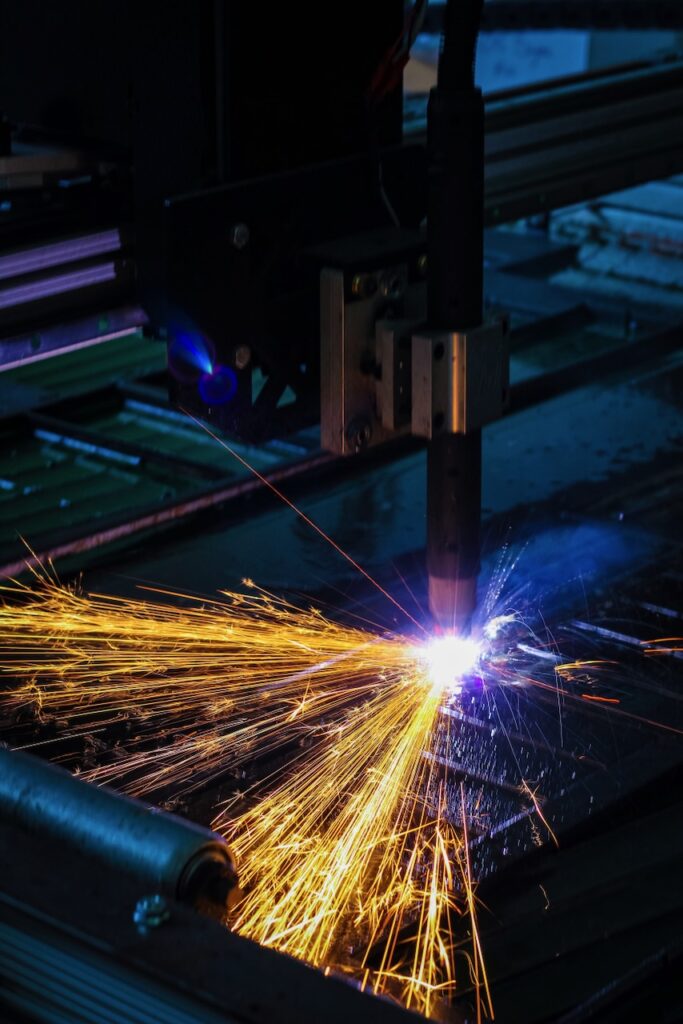
Why choose Welding Technology at OCCC?
Oregon Coast Community College (OCCC) and Lincoln County School District (LCSD) have partnered with the Port of Toledo to create a state of the art Welding Training Lab at the Port of Toledo Shipyard. Additionally, a smaller facility has been developed at Taft High School in Lincoln City to serve students in the northern portion of the county.
Our welding faculty are dedicated teachers with real-world experience. Together you will learn in facilities developed to teach you the hands-on skills employers seek.
Currently, the OCCC Welding program offers students the ability to register for part-time instruction, and complete up-to three courses per term (two hands-on and one lecture). Students can start during any term (except summer).
Oregon Coast Community College offers a Shipbuilding & Repair Level II certificate. The certificate is comprised of four individual stepped certificates that culminate in one 48 credit hour Shipbuilding & Repair Level II certificate.

Welding Certificates
Shipbuilding & Repair Level II Certificate (48 credits)
Financial Aid Eligible
Oregon Coast Community College offers a Shipbuilding & Repair Level II certificate. The certificate is comprised of four individual stepped certificates that culminate in one 48 credit hour Shipbuilding & Repair Level II certificate
- Shielded Metal Arc Welding (SMAW) Level I Certificate (12 credits)
- Wire Feed Welding Certificate (12 credits)
- Shielded Metal Arc Welding (SMAW) Level II Certificate (12 credits)
The Ship Building and Repair Level II Certificate allows students to develop entry-level skills in stick (SMAW) and wire feed (GMAW/FCAW) welding. SMAW is used in construction and manufacturing in environments ranging from indoors to ships out at sea. GMAW has a variety of applications ranging from small shops to major production facilities. FCAW is high-speed, portable, and well-suited to outdoor applications. All three forms of welding are suitable for applications in shipbuilding and repair.
Note: Only the Shipbuilding & Repair Level II Certificate is eligible for Federal and State Aid. Students pursuing the Shipbuilding & Repair Level II Certificate will earn the four smaller individual certificates along the way. However, none of the 12 credit certificates are, by themselves, Financial Aid eligible.
Shipbuilding & Repair Level I Certificate
Not Financial Aid Eligible
This 12-credit hour certificate introduces students to basic stick (SMAW) and Flux Core (FCAW) welding and is intended for students who do not intend to complete the larger Shipbuilding and Repair Level II Certificate.
Program Costs
Program Costs for the 2023-24 Academic Year.
Please also see Cost of Attendance for more information on Financial Aid.
Consult the Tuition & Fees Page to find the current tuition- and fees-per-credit to apply to the credits indicated below.
Note that Welding Lab Fees ($50/credit) also apply, in addition to tuition.
Ship Building and Repair Level II (Financial Aid Eligible)
· This 48-credit certificate is composed of the Foundational Welding Skills (12 credits), Shielded Metal Arc Welding Level I (12 credits), Shielded Metal Arc Welding Level II (12 credits), and Wire Feed Welding (12 Credits) Certificates
Shielded Metal Arc Welding Level I (NOT Financial Aid Eligible): 12 Credits
Shielded Metal Arc Welding Level II (NOT Financial Aid Eligible): 12 Credits
Wire Feed Welding Level I (NOT Financial Aid Eligible): 12 Credits
Ship Building and Repair Level I (NOT Financial Aid Eligible) – Not included in the Ship Building and Repair Level II Certificate: 12 Credits
Job Openings
Many trades employ welding skills. Employment prospects in the Northwest Oregon area (which includes Lincoln County) are moderate. The Oregon Employment Department forecasts 20 welding job openings per year through 2031.
Salary
The Oregon Employment Department reports that Northwest Oregon area (which includes Lincoln County) workers earn between $18.69 to $26.37 per hour. The average annual salary is $54,848.
Financial Aid Eligibility
Only the Ship Building and Repair Level II Certificate is eligible for Federal and State aid.
Admission Process
This is a limited entry program, and students are admitted on a first-come, first-serve basis. New students should complete the OCCC application and meet their Student Success Coach
Required Materials
The following materials are required for all students taking Welding Lab Courses (WLD 111, WLD 112, WLD 113, WLD 114, WLD 115, WLD 131, WLD 141, WLD 151, and WLD 152).
Pricing: Consult the Required Materials Price List
- Welding Hood
- Welding Jacket
- SMAW Welding Gloves
- Leather Work Gloves
- Slag Hammer and Wire Brush
- Safety Glasses
- Soap Stone
- Tape Measure
Supplies can be purchased through Industrial Welding Supply in Newport, Oregon (541-867-8181). Students will also need to purchase all leather, steel toe work boots (such as Wolverine Wellington or Caterpillar Revolver). Additionally, students will also need to purchase the Welding Principles and Applications by Larry Jeffus, 7th edition or newer. The most recent edition will be available through the College Bookstore.



